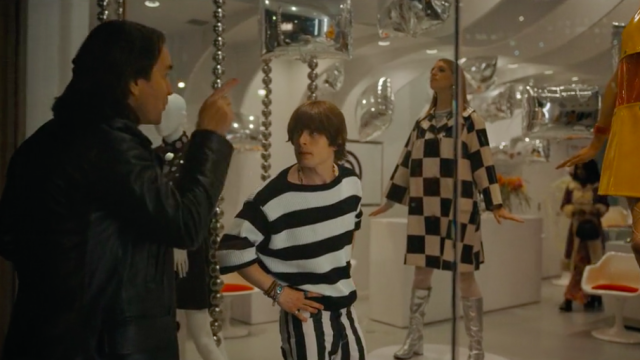Though Netflix’s Halston primarily focuses on the life of its titular fashion designer, who built an empire on minimalist silhouettes and Ultrasuede, the miniseries also spotlights a number of important figures who came into Halston’s orbit while they were on their own journeys to stardom. One that piqued our interest? Joel Schumacher.
Halston opens with Roy Halston Frowick (played by our once again Obi-Wan, Ewan McGregor) having already established himself as a household name after becoming Bergdorf Goodman’s chief milliner, and styling Jackie O in her iconic pillbox hat. While Halston was a name brand at that point in his life, the fast-changing whims of the ‘60s fashion world required him to reinvent himself to a certain degree in order to stay relevant — and to do that, he decides to quit his job.
The first episode follows as he sets out to found his own atelier in order to showcase original creations meant to rival European high fashion houses like Balenciaga. Talented though Halston was, he understood he couldn’t accomplish those goals alone, which is why he enlisted people like entertainer Liza Minnelli (Krysta Rodriguez), designer Elsa Peretti (Rebecca Dayan), illustrator Joe Eula (David Pittu), and interior designer Angelo Donghia (Andrew Elvis Miller).
As clearly defined as everyone else’s role in Halston’s new endeavour is, junior partner Joel Schumacher (Rory Culkin) is a little more nebulous after Halston poaches him from Paraphernalia, a New York City mod boutique that the real Joel Schumacher co-founded in 1965.
Rather than using Halston and Schumacher’s real-world meeting on Fire Island as the basis of their working relationship, Netflix’s Halston reimagines and simplifies it to the more established designer taking note of one of the young upstart’s window settings and demanding that he come work for him.
Even though the series somewhat downplays how the actual Schumacher was very much a rising star when he began working with Halston, and Culkin only appears in the first episode, the series emphasises how much faith Halston put in Schumacher’s raw talent despite his rather hypocritical concerns about Schumacher’s drug use.

In the decades before his death in 2020, Joel Schumacher was quite open about his early years of alcohol and drug abuse that became part of his extravagant mythos as he went on to become an installation in the worlds of fashion, theatre, and film. Halston’s respect for Schumacher’s legacy is evident, but it uses his brief appearance to illustrate the kinds of excess that would soon ruin a number of his employers’ personal and professional relationships.
Days before the new atelier is meant to open and with plenty of work still left to do, Halston’s mildly shocked when he discovers Schumacher shooting speed in the bathroom while at work, and while he expresses some distaste at the idea he isn’t particularly judgmental. Halston seems to have some genuine concern when Schumacher explains how, between the stresses of opening the atelier and working long hours, shooting up is part of how manages to get through the day, and while Halston ultimately decides to fire the younger man, he also learns a kind of lesson.
As Halston continues, you see how open, casual drug use throughout the workday became part of the Halston experience. In the show, it reads very much like the designer having decided to follow Schumacher’s example by normalising doing piles of coke to keep his creative momentum going for years before the very real drawbacks of the habit became unignorable.
Rather than glamorising or moralistically demonising either Schumacher or Halston’s issues with substance abuse, Halston instead treats them as matters of fact about the men that are parts of their histories that didn’t define them, but certainly shaped moments in their lives. Joel Schumacher went on to tell the kinds of stories that enshrined him as a unique talent within Hollywood who is worth appreciating in his fullness and not just the things we often celebrate about him.
Many of the people fandoms hold up and revere are just that — people who are complicated being just like the rest of us, and understanding that about them is a key part of truly doing justice to their legacies.
Halston is now streaming on Netflix.
